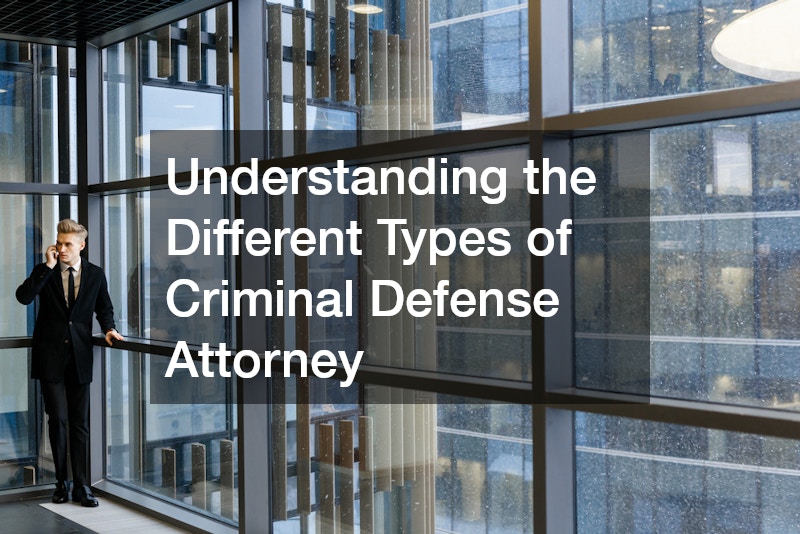
When facing criminal charges, one of the most important decisions you can make is choosing the right criminal defense attorney. Not all defense attorneys handle every type of case, and selecting one with experience in the specific charges you face can make a significant difference. The field of criminal defense is broad, encompassing various areas of law that require specialized knowledge and courtroom skill. Below, we explore the major types of criminal defense attorneys and the unique roles they play in protecting the rights of the accused.
General Criminal Defense Attorney
A general criminal defense attorney handles a wide range of criminal cases. These may include misdemeanors and felonies such as theft, assault, DUI, drug possession, and more.
These attorneys are often the first line of defense for individuals unfamiliar with the legal system. They guide clients through arrest procedures, arraignments, plea negotiations, trials, and sentencing.
General criminal defense attorneys are skilled in legal strategy and can often negotiate reduced charges or sentencing alternatives. Their breadth of experience allows them to adapt to different types of cases and provide solid legal representation.
DUI/DWI Defense Attorney
A DUI or DWI defense attorney focuses on defending clients charged with driving under the influence of alcohol or drugs. These attorneys understand the intricacies of sobriety testing procedures, breathalyzer accuracy, and field testing protocols. They can challenge the legality of the traffic stop, the arrest process, or the admissibility of evidence.
Since DUI convictions can lead to license suspension, jail time, and long-term consequences, having an attorney who specializes in DUI defense can significantly impact the outcome of the case.
Drug Crimes Attorney
Drug crimes attorneys focus on defending individuals charged with offenses involving controlled substances. This includes possession, trafficking, distribution, manufacturing, and prescription drug fraud. These attorneys are well-versed in federal and state drug laws, as well as constitutional protections related to search and seizure.
A drug crimes attorney can evaluate whether law enforcement followed legal procedures when collecting evidence and can work to suppress illegally obtained evidence. Their expertise is crucial in minimizing penalties or achieving case dismissals.
Violent Crimes Attorney
Violent crimes attorneys represent clients accused of serious offenses such as murder, manslaughter, assault, robbery, and domestic violence. These cases often involve complex legal arguments, forensic evidence, and witness testimony. A criminal defense attorney specializing in violent crimes must be skilled in trial preparation, cross-examination, and the use of expert witnesses.
Due to the severity of potential penalties, including lengthy prison sentences, it’s critical to have an attorney who understands the nuances of violent crime litigation.
White-Collar Crimes Attorney
White-collar crime involves non-violent offenses typically committed in business or professional settings. Common examples include fraud, embezzlement, insider trading, and identity theft. White-collar crimes attorneys are knowledgeable in financial regulations, forensic accounting, and electronic discovery.
These attorneys often deal with cases that require a deep understanding of complex financial transactions and legal compliance. Their role is essential in defending against allegations that may stem from misunderstandings or mismanagement rather than criminal intent.
Federal Criminal Defense Attorney
Federal crimes are prosecuted by the U.S. government and usually carry more severe penalties than state-level offenses. Examples include terrorism, large-scale drug trafficking, immigration violations, and crimes that cross state lines. A federal criminal defense attorney must be admitted to practice in federal court and be familiar with the Federal Rules of Criminal Procedure.
These cases often involve federal investigators and agencies such as the FBI, DEA, or Homeland Security. A federal criminal defense attorney must be adept at handling high-stakes cases, extensive pre-trial motions, and lengthy trials.
Juvenile Defense Attorney
Juvenile defense attorneys focus on representing minors charged with criminal offenses. The juvenile justice system differs significantly from the adult system, emphasizing rehabilitation over punishment. These attorneys understand the unique legal standards that apply to minors and advocate for alternative sentencing options, such as counseling, education programs, or probation.
Hiring a juvenile defense attorney ensures that the young person’s rights are protected while also helping guide them toward a more positive path.
Sex Crimes Attorney
Sex crimes attorneys handle cases involving charges such as sexual assault, indecent exposure, child pornography, and rape. These cases often carry a social stigma and can severely damage a person’s reputation and future opportunities. A criminal defense attorney in this field must navigate sensitive evidence, emotionally charged testimonies, and complex consent laws.
Due to the seriousness of these accusations, it’s important to have a defense attorney with experience in preserving the presumption of innocence and challenging questionable evidence or witness credibility.
Understanding these differences can help individuals make informed decisions when seeking representation. No matter the charge, having a dedicated and experienced criminal defense attorney on your side can be the key to protecting your rights and your future.





